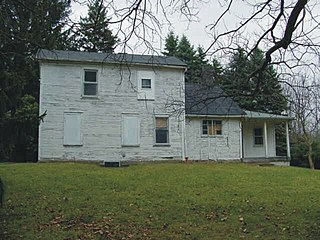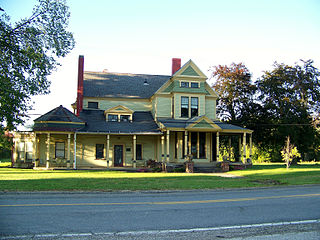
A town is a human settlement. Towns are generally larger than villages but smaller than cities, though the criteria to distinguish them vary considerably between different parts of the world.

Colerain Township is one of the twelve townships of Hamilton County, Ohio, United States, and home of the Crazed Pickles. The population of the township was 58,499 at the 2010 census. It is the second-largest township in Ohio by population to West Chester Twp., Butler County, Ohio and the second-largest in area to Madison Township, Lake County, Ohio.
A civil township is a widely used unit of local government in the United States that is subordinate to a county. The term town is used in New England, New York, and Wisconsin to refer to the equivalent of the civil township in these states. Specific responsibilities and the degree of autonomy vary based on each state. Civil townships are distinct from survey townships, but in states that have both, the boundaries often coincide and may completely geographically subdivide a county. The U.S. Census Bureau classifies civil townships as minor civil divisions. Currently, there are 20 states with civil townships.
A township in the United States is a small geographic area.

Trustee is a legal term which, in its broadest sense, is a synonym for anyone in a position of trust and so can refer to any person who holds property, authority, or a position of trust or responsibility to transfer the title of ownership to the person named as the new owner, in a trust instrument, called a beneficiary. A trustee can also refer to a person who is allowed to do certain tasks but not able to gain income, although that is untrue. Although in the strictest sense of the term a trustee is the holder of property on behalf of a beneficiary, the more expansive sense encompasses persons who serve, for example, on the board of trustees of an institution that operates for a charity, for the benefit of the general public, or a person in the local government.

Richfield Township is one of the nine townships of Summit County, Ohio, United States. The 2000 census found 5,424 people in the township, 2,138 of whom lived in the unincorporated portions of the township.

Freedom Township is one of the eighteen townships of Portage County, Ohio, United States. The 2000 census found 2,751 people in the township.

Ravenna Township is one of the eighteen civil townships of Portage County, Ohio, United States. The 2000 census found 9,270 people in the township.

Adams Township is one of twelve townships in Warren County, Indiana. According to the 2010 census, its population was 512 and it contained 250 housing units.

Mound Township is one of twelve townships in Warren County, Indiana, United States. According to the 2010 census, its population was 418 and it contained 183 housing units.

Pike Township is one of twelve townships in Warren County, Indiana, United States. According to the 2010 census, its population was 1,221 and it contained 529 housing units.

Prairie Township is one of twelve townships in Warren County, Indiana, United States. According to the 2010 census, its population was 257 and it contained 117 housing units; the population density is the lowest of any township in the county, at 6.1 inhabitants per square mile (2.4/km2).

Steuben Township is one of twelve townships in Warren County, Indiana, United States. It was established in 1834. According to the 2010 census, its population was 487 and it contained 199 housing units. It contains no incorporated towns and is largely agricultural.

Florence Township is one of the twelve townships of Williams County, Ohio, United States. The 2000 census found 2,115 people in the township, 1,087 of whom lived in the unincorporated portions of the township.

Hicksville Township is one of the twelve townships of Defiance County, Ohio, United States. The 2010 census found 4,979 people in the township, 1,398 of whom lived in the unincorporated portions of the township.

Milford Township is one of the twelve townships of Defiance County, Ohio, United States. The 2010 census found 1,081 people in the township.

Amherst Township is one of the eighteen townships of Lorain County, Ohio, United States. The 2000 census found 7,598 people in the township, 6,174 of whom lived in the unincorporated portions of the township.

Mad River Township is one of the ten townships of Clark County, Ohio, United States. The 2010 census reported 11,156 people living in the township, 8,741 of whom lived in the unincorporated portions of the township.
A township trustee is an elected official in the local government of the U.S. state of Indiana. A township trustee administers a township, which in Indiana is the primary political subdivision of a county, and in common with most other state officials serves a term of four years.
The government of Indiana is established and regulated by the Constitution of Indiana. The state-level government consists of three branches, the judicial branch, the legislative branch, and the executive branch. The three branches share power and jointly govern the state of Indiana. County and local governments are also constitutional bodies with limited authority to levy taxes, pass legislation, and create and maintain local public infrastructure.















